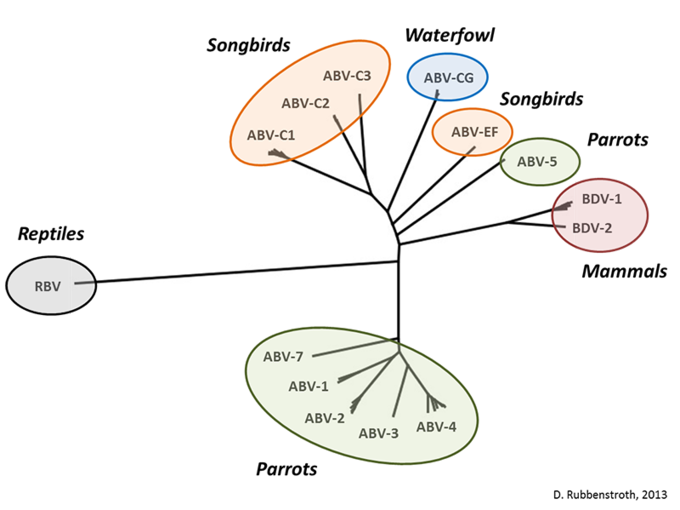Epidemiology and pathology of avian bornaviruses
Avian bornaviruses (ABV) are the causative agents of proventricular dilatation disease (PDD), a widely distributed and often fatal disease in parrots (Psittaciformes) including several endangered species. ABVs induce persistent infections, predominantly affecting neuronal tissues. Diseased birds suffer from neurological signs as well as from impaired motility of the intestinal tract, resulting in congestion of feed and dilatation of the proventriculus.
Recent data suggest that ABVs are also prevalent in additional bird species, including song birds (Passeriformes) and wild waterfowl (see figure), but the clinical significance of the viruses in these species remains unknown.
Open questions presently being investigated in our group include:
a) Prevalence and genetic diversity of ABV genotypes in pet birds and wild bird population.
b) Diagnosis of ABV infection by virus isolation, molecular methods and serology
c) Pathogenesis and transmission of ABV infections using experimental animal model systems (cockatiel, canary bird)
d) Generation of vaccines for the protection of birds against ABV infections
Selected Publications from our group
- Rubbenstroth, D., Brosinski, K., Rinder, M., Olbert, M., Kaspers, B., Korbel, R., Staeheli, P., 2014. No contact transmission of avian bornavirus in experimentally infected cockatiels (Nymphicus hollandicus) and domestic canaries (Serinus canaria forma domestica). Vet. Microbiol., doi: 10.1016/j.vetmic.2014.1005.1011.
- Rubbenstroth, D., Schmidt, V., Rinder, M., Legler, M., Corman, V.M., Staeheli, P., 2014. Discovery of a new avian bornavirus genotype in estrildid finches (Estrildidae) in Germany. Vet. Microbiol. 168, 318-323.
- Rubbenstroth D, Rinder M, Stein M, Hoper D, Kaspers B, Brosinski K, Horie M, Schmidt V, Legler M, Korbel R, Staeheli P. 2013. Avian bornaviruses are widely distributed in canary birds (Serinus canaria f. domestica). Vet Microbiol 165:287-295.
- Rubbenstroth D, Rinder M, Kaspers B, Staeheli P. 2012. Efficient isolation of avian bornaviruses (ABV) from naturally infected psittacine birds and identification of a new ABV genotype from a salmon-crested cockatoo (Cacatua moluccensis). Vet Microbiol 161:36-42.
- Reuter A, Ackermann A, Kothlow S, Rinder M, Kaspers B, Staeheli P. 2010. Avian Bornaviruses escape recognition by the innate immune system. Viruses 2:927-938.
- Staeheli P, Rinder M, Kaspers B. 2010. Avian bornavirus associated with fatal disease in psittacine birds. J Virol 84:6269-6275.
- Rinder M, Ackermann A, Kempf H, Kaspers B, Korbel R, Staeheli P. 2009. Broad tissue and cell tropism of avian bornavirus in parrots with proventricular dilatation disease. J Virol 83:5401-5407.
Collaboration
Dr. Monika Rinder, Prof. Rüdiger Korbel, Prof. Bernd Kaspers and Prof. Gerd Sutter, LMU Munich
Dr. Angela-Römer Oberdörfer, FLI Insel Riems


